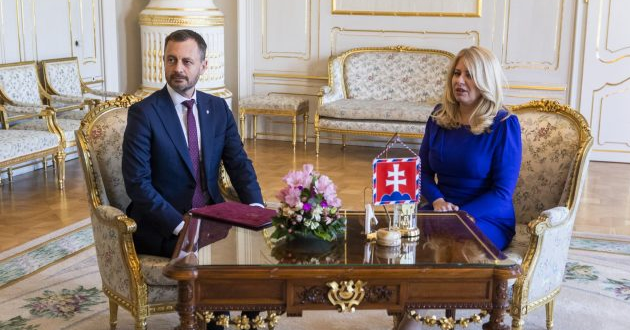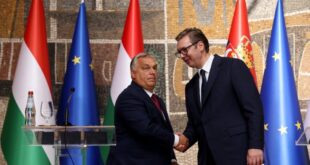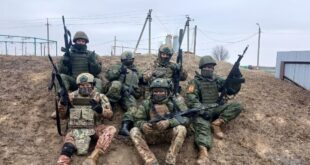There is the real prospect of the pro-Russian nationalist-populist Robert Fico returning to power after the September election.
Slovakia is set for its third government in as many years after Eduard Heger stepped down as prime minister on Sunday. Even though the full details of the interim technocratic government that will take over are yet to be revealed in full, most eyes are rather fixed on the coming election in September.
The general election will come at a crucial time for Slovakia, the region and Europe. Slovakia under the last three coalition governments headed by Heger’s OLaNO party have been strongly pro-Western and a major ally of Ukraine as it resists Russian aggression. But with Robert Fico’s Smer party leading in the polls, there is a real prospect of the pro-Russian nationalist-populist former prime minister returning to power.
The departed but mostly unlamented coalition government, the first version of which was pieced together in February 2020 by four parties in a push to unseat Fico’s Smer party following eight years of increasing authoritarianism and corruption, certainly wasn’t helped by circumstances.
The COVID-19 pandemic hit immediately after it assumed office, helping to unseat the combustible Igor Matovic – leader of OlaNO, a ragtag centre-right populist party that surprised everyone by garnering most votes in the election – from the prime minister’s chair. Russia then unleashed its war in neighbouring Ukraine, followed by an energy crisis and vicious inflation spike.
With Matovic demoted but continuing his provocative behaviour from the seat of the Finance Ministry, the grip of his replacement Heger slipped late last year, when after months of ill-tempered sniping, the SAS coalition party quit the government.
Opposition parties called for a snap election, but the governing parties resisted and delayed the vote to September 30. President Zuzana Caputova allowed Heger to limp on with a minority cabinet.
But having failed to win a vote of confidence in parliament, that cabinet remained precarious. Hence, a corruption scandal around the agriculture minister that flared up late last week swiftly engulfed it, and Heger fell on his sword on Sunday.
Caputova has been quick to name a temporary technocratic replacement. After half a year of waiting in the wings, Ludovit Odor will finally get his chance to govern Slovakia, when his caretaker government is appointed as expected on May 15.
The deputy governor of the central bank had been lined up in the background, ready for such a collapse, since the start of the year. The economist is little known by the public, but has long served in public institutions. His pro-European democratic credentials fit well with Caputova’s own outlook.
The president has not yet revealed the rest of her ‘government of the experts’, noting only that none of the temporary ministers will seek election in September.
“It will be a government of the people, for whom governance will not be an election campaign,” the president stated. “The members of the new government were chosen according to expertise, so naturally there will be people from both conservative and liberal backgrounds.”
That mixed make-up is also a nod to the fact that the cabinet will need to try to secure parliamentary approval within 30 days of its appointment. Should it fail in that, the president must dismiss it, but can ask it to continue in a caretaker capacity.
‘Progressive coup’
There’s still a lack of clarity over the final make-up of Slovakia’s next government, but Heger’s fall has only raised the temperature ahead of the September election.
On the back of a recent surge in the popularity of his Smer party, Fico is demanding that the vote be brought forward to July. However, he’s unlikely to secure the three-fifths majority that he would need in parliament to make it happen.
In the meantime, he will try to use the current impasse to rally support, with populist forces claiming that Caputova and others are carrying out a “progressive coup”.
The former prime minister, under whose rule Slovakia slid towards authoritarianism and unrestrained corruption, was unseated by the 2018 murder of journalist Jan Kuciak.
His protege Peter Pellegrini took over the premiership until Smer was ousted from office in 2020 by Matovic and his coaliton partners. Pellegrini then departed to form Hlas, a party intended to fill the centre-left void left as Smer moved steadily into nationalist-populism that parroted Kremlin narratives about the war it started.
Hlas has led the polls throughout much of the intervening time, but Smer overtook it earlier this year. And although both sit on around 17 per cent, the party has maintained its lead, seemingly boosted by Fico’s increasing extremism, including staunch opposition to COVID-19 vaccinations and Bratislava’s military support for Ukraine.
But at the same time, Fico remains unacceptable to a large chunk of the Slovak political spectrum, while Pellegrini, a more moderate social democrat, is believed to be unenthusiastic about teaming up with Smer.
“While two centre-left opposition parties are clear favourites to receive the most votes in September, the outcome of the election is less certain,” says Andrius Tursa at Teneo Intelligence.
Instead, Pellegrini could try to construct a multi-party anti-Fico coalition from the debris on the centre-right, where the support of several parties has been fragmented by the collapse of the coalition and the failure to convince the country that the parties could rise above petty squabbling to deal with the economic and societal issues dividing the country.
Revenge
Concern that Slovakia’s deep and seemingly endless political crisis could offer Fico, accused of subverting the country’s democratic institutions in order to build a “mafia state” during his decade of political dominance, the chance to get his hands back on the levers of power have rarely lifted since he was deposed.
The worry has only grown as the government’s slow-motion collapse has unfolded, and as Smer rises in the polls so too has the worry that he could once again be given the opportunity to undermine Slovakia’s fragile democracy and pull the country away from its Western orientation.
“The risk to democracy that Fico poses is very real,” argues Grigorij Meseznikov of the Slovak Institute for Public Affairs. “He wants revenge and would purge democratic institutions.”
Following the revelations of high-level corruption, crony capitalism and organised crime that Kuciak’s murder revealed, efforts have been made to clean up the judicial system and police. These even saw Fico charged with running an organised crime gang from the prime minister’s office, although he was saved by parliament’s surprising refusal to remove his immunity and then the decision by the prosecutor general to controversially drop the charges.
However, the ranks of voters ready to forgive Fico his sins in return for the populist economic policies he promises to the less well-off and pensioners appears to be growing.
His culture war tactics, hostility towards the EU, and promises to work for “peace” in Ukraine and end the shipment of weapons to Kyiv are also popular with a sizeable chunk of the electorate.
“Fico wouldn’t be able to pull Slovakia out of NATO,” continues Meseznikov, “but he would make it into another NATO state working with Moscow’s narrative, like Hungary.”
Many of his supporters are even in favour of Fico’s cooperation with far-right parties, which looks likely to be key if he’s to cobble together enough seats in parliament to form a government following the election.
But at the same time, any attempt by Fico to pull Slovakia back to the east would face significant opposition, with political preferences illustrative of a deepening polarisation in the country.
While Fico’s nationalist populism, invoking both communist and far-right tropes, is increasingly finding favour in certain parts of the electorate, Caputova, heralded when she was elected as a symbol of Central Europe’s liberal hopes, remains Slovakia’s most popular political figure.
“This schism is deep and deepening amid the growing foreign policy pressures of recent years, and now especially the question regarding Russia,” says Meseznikov.
 Eurasia Press & News
Eurasia Press & News



